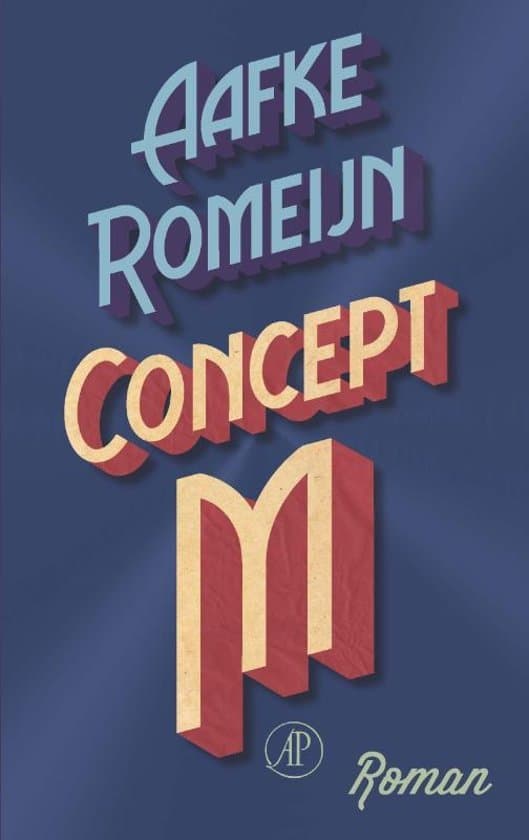‘Concept M’ by Aafke Romeijn: The Cancer of Colourlessness
In the science fiction novel Concept M author Aafke Romeijn takes the reader forward to the Netherlands of 2020, where the disease of colourlessness makes for heated, polarizing debate and protest.

Science fiction and Dutch-language literature: it hasn’t been the most successful match. Dutch writers of literary science fiction are few and far between. In 2017, journalist Joost Devriesere debuted with Pest (Plague), a dystopian novel about a provincial town where the majority of the population suddenly falls asleep. While the few reviews to appear were unanimous in their recommendations, overall the book registered little attention. In 2018, another writer, Rob van Essen, successfully used elements of the science fiction genre in his recent novel De Goede Zoon (The Good Son).
Devriesere was noticed by Oscar van Gelderen at the Lebowski publishing house, and started to write content for the digital magazine 2.3.74. Perhaps a sign of the lack of appreciation of science fiction in the Low Countries, the stories there appear only in English: the Flemish and Dutch authors (including Joost Vandecasteele and Hanna Bervoets) writing science fiction predominantly recall and reflect an American style, such as that of author Philip K. Dick.
Colourlessness as a disease
Aafke Romeijn forges a new path. Last year, the singer-songwriter who made a name for herself in Dutch-language electropop published her first book, Concept M, a story set not so far in the future, in the Netherlands of 2020. Nevertheless, the country is much changed: there is only one political party, the Centre party, while two topics dominate the social debate.
First, there is the issue of corruption: the corpulent Prime Minister Stork from Limburg is suspected of conflict of interest in granting licences to pharmaceutical companies that make medicated dye for the colourless. Secondly, these colourlessare the topic of discussion. Colourlessness is a hereditary disease which results in loss of pigmentation in carriers of the virus (grey hair, translucent skin, dull eyes, black fingernails), and in addition, literally makes them very brittle. Only the administration of an expensive dye, via a device between the shoulder blades, can keep the colourless alive.
 Aafke Romeijn
Aafke Romeijn© De Arbeiderspers
The 'grey bill'
The Netherlands is divided into two camps. A majority of people believe that society must help the colourless: rather than discriminate against them, additional measures should be taken to support them. On the other hand, there is a small but growing group of critics who believe that the colourless are pampered enough, and that they are costing too much money. At their most sympathetic, they simply ask: Who is going to foot the ‘grey bill’? while their most punishing slogan runs: Colourlessness is the cancer that will destroy our civilization. Thus they advocate for restrictive sterilisation. Threatening to break the hegemony of the Centre party, their political spokesperson, who has climbed sharply in the polls during the electoral campaign, is eliminated with a bullet.
Refreshing social critique
Romeijn tells the story of Hava Gerritsen, a 25-year-old colourless on her way to hospital to change her status or Concept – how much a patient must contribute to the medicated dye – to M. That means: the patient refuses all further medication, leading to death within 48 hours. Having understood the greater interest for society as a whole, Hava has “stepped over her own shadow”: the colourless must disappear, and so she begins with herself. She has joined a terrorist group that attacks producers of dye, and wants to mediatise her voluntary death into a grand event. All to the great sadness of her mother, a public intellectual and one of the most vocal defenders of increased rights and resources for the colourless. On her way to hospital, over the car radio Hava listens to the reporter who is awaiting her arrival, interspersed with fragments of the emergency debate on the affairs of the teetering Prime Minister.
In reading Concept M, the links with contemporary debates on migration, race, gender, the cost of health care or even climate issues are clear to see. However, Romeijn does not over-impose with her social critique, on the contrary. The book is written with humour and grace, and it has a surprising ending.
In the Netherlands, Concept M received a handful of rave reviews; in Flanders, the book has gone virtually unnoticed. That’s a shame. This original book from a voice against-the-grain truly deserves a wide audience.
Aafke Romeijn, Concept M, De Arbeiderspers, Amsterdam, 2018, 262 pp.
Read some excerpts from Concept M below, as translated by Paul Vincent.












